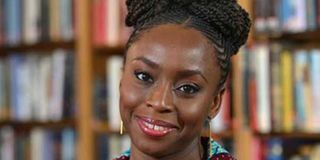What’s feminism got to do with it?

Nigerian author Chimamanda Ngozi Adichie. Women have been taught to be either pretty or smart, but never both. A dilemma writer Chimamanda Adichie addressed in her TED Talk, Why Everyone Should Be A Feminist. PHOTO/FILE
What you need to know:
- Models, fashion editors and magazines sit pretty at the top. But the real power players and decision-makers are male, from fashion designers, photographers and publishing house owners.
- Even though fashion has perpetuated objectification of women, it has, paradoxically, allowed them to repossess their sexuality, define, recreate and reimagine themselves; empowerment is a persistent theme.
- There is a challenge combining a political movement with something as fleeting as fashion.
Hi. I am Carol Odero and I am a feminist. Fashion and feminism have never been BFFs. Thanks to the founding mothers who found femininity a male construct designed to keep women in check, loving fashion became a faux pas for serious women.
So insidious was it that women have felt compelled to keep feminism a clandestine choice. Fashion is in some ways like hip hop – hard to defend.
Models, fashion editors and magazines sit pretty at the top. But the real power players and decision-makers are male, from fashion designers, photographers and publishing house owners. Collectively, they execute a dance choreographed centuries ago.
However, fashion editors can be said to be feminists for several reasons. Few professions offer as wide a parameter and autonomy when it comes to self-imaging, branding and imagination than editing fashion magazines.
They are far more autonomous than people who work at Google! It is because of this that fashion magazine editors are able to transmit to women about who they are, should be and look like.
And, perhaps, it is for this reason as well that millennials have not exactly sung praises of feminism. They have not felt a lack. Magazines have made them feel anything a man can do, a woman does in six inch heels, red lipstick, a smoky eyes and no bra.
PRETTY OR SMART
And the past decade has offered up a smorgasboard of visuals from strong, lean, toned and fit bodies like Ciara and Rihanna’s, Beyonce, Halle Berry, Kim Kardashian and J-Lo’s fuller hips, Kate Upton’s full breasts, Cameron Diaz and her thin figure with what are considered the best legs in the world; women are not stuck on one physical ideal.
Add to this Tyra assuring women their oddities make them beautiful compounded with Oprah’s legacy of emotional articulation and it’s near impossible to think women repressed. Except the disengagement the feminist movement has had with fashion has been a gross disservice.
Women shape fashion. Seminal moments in fashion clearly indicate this. Post-WWII, women got sick of factory/industrial chic and needed to feel pretty and feminine again after holding the fort when their men went to war.
In the ‘80s, women entered the workplace in droves gifting us power suits –to go toe to toe with men. The noughties have a deeply feminine yet androgynous mystique coupled with a message that women come on their own terms.
Even though fashion has perpetuated objectification of women, it has, paradoxically, allowed them to repossess their sexuality, define, recreate and reimagine themselves; empowerment is a persistent theme. It taps into financial, economic, political, cultural and emotional expansion women have experienced the past century.
Women have been taught to be either pretty or smart, but never both. A dilemma writer Chimamanda Adichie addressed in her TED Talk, Why Everyone Should Be A Feminist.
“I grew up being told that I had to look in the mirror. You know, my mother made history. She was the first woman to be head of the administrative section of the University of Nigeria, and she was very concerned about her appearance, and she brought all her children up to. And so I came to the US and I realised serious women were not supposed to, and that if you did look as though you cared, it was a reason to be dismissive of you.
“I think I just really have come to understand that life is way too short to pretend to be what I’m not, and it sounds very New Agey and clichéed but I just really want to be my true self, and this is my true self. I think, for so long, when I would find black shapeless shifts for every event, I was just being false, that was not myself, but I was thinking, “I have to look serious.”
FADS AND FASHION
“I admit I am deeply superficial. I care how I look. I love my clothes, collect shoes, pay great attention to my skin and aspire to buns of steel. I gravitate towards thigh-skimmers and dye my hair red and I think my broad shoulders signify psychological strength. I call myself a feminist because I will fight for a woman’s right to wear whatever she so chooses, be it blue hair, a caftan, locks, a weave or Tom Ford man’s suit. I fully believe it to be her prerogative.”
There is a challenge combining a political movement with something as fleeting as fashion.
How long can it possibly last? How deep can it even sink? And, does Wanjiku care beyond clothes keeping her respectable and allowing her to provide for her family?
There is a less profound inclination at play. Who has power in fashion? Is it the maker or the wearer? The latter is inundated with choices and gets to pick. How much does that inform the maker?
For a global, trillion-dollar industry enamoured of a woman’s appeal, both purchasing power and physicality, it is simple and complicated at the same time.





